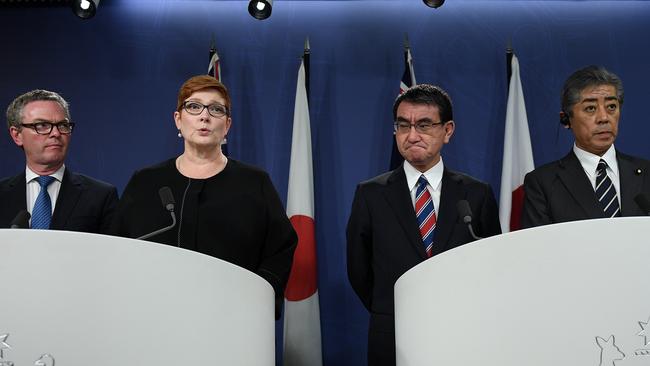India not convinced of Quadrilateral Security Dialogue’s worth
Australia admits further work is needed to convince India of the importance of the Quadrilateral Security Dialogue.

Australia has acknowledged further negotiations will be needed to convince India of the importance of the Quadrilateral Security Dialogue after New Delhi dealt a blow to the diplomatic group aimed at managing China’s influence in the region.
The Australian earlier this year revealed India had snubbed Australia from the Malabar naval exercises, which Canberra hoped would include the Royal Australian Navy and forces from Japan, India and the US.
Defence Minister Christopher Pyne said: “I’m an unabashed enthusiast for expanding the Australia-India relationship … and I think it’s fair to say we have some work to do to ensure that the other three members of the quadrilateral see Australia’s engagement as genuine and long-lasting into the future, and that’s all about actions not just words.
“We welcome Japan’s support for the quadrilateral between our four countries and we look forward to them assisting to make sure that India and the US all recognise it as an important forum.
“I see all these forums as significant.”
Scepticism in relation to the relaunched quadrilateral remains after signs that Indian leaders were not enthusiastic about it including a military component. To date, there have been only two meetings involving officials from the four countries.
Australia and Japan defence and foreign ministers yesterday met in Sydney to discuss North Korea, the South Pacific and China’s militarisation of the South China Sea.
Japan has supported Australia playing a more significant role in countering China’s influence in the region and militarisation in the South China Sea.
In a sign of reconciliation between the countries, the ministers also visited the war memorial at HMAS Kuttabul.
The site commemorates the 21 Australian and British sailors who were killed when three Japanese midget submarines sunk a converted ferry in Sydney Harbour in a surprise attack.
Former Japanese diplomat to Australia, Yuichi Takatsuka, recently said Scott Morrison needed to consider joint naval exercises with Tokyo to maintain pressure on China over their actions in the South China Sea. “Australia should stay firm in dealing with China, as Japan does. Rhetorical pressure also doesn’t work on China. So Abe can encourage Morrison to take a meaningful action with Japan, just as Japan did with UK recently,” Mr Takatsuka wrote in the Lowy Institute’s Interpreter.
A joint statement released by Mr Pyne and his Japanese counterpart Takeshi Iwaya “reaffirmed their determination” to “pursue deeper and broader defence co-operation, including exercises”.
Mr Pyne said he looked forward “to announcements about that down the track”.
Australia and Japan, in the joint statement, also said North Korea had breached the cap on fuel imports imposed by the UN Security Council in the joint statement.
Australia last month sent two AP-3C Orion maritime patrol aircraft to conduct maritime surveillance to monitor illicit North Korean ship-to-ship fuel transfers that break sanctions.


